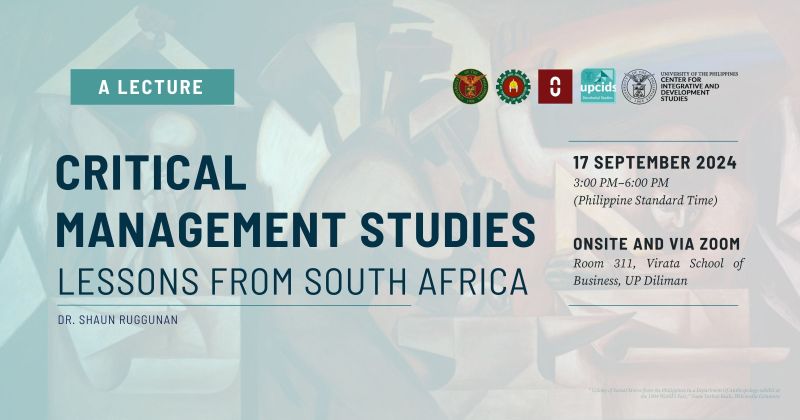Critical Management Studies: Lessons from South Africa: A Public Lecture

The Decolonial Studies Program of the UP Center for Integrative and Development Studies, the UP Diliman School of Labor and Industrial Relations (UP SOLAIR), and the UP Diliman Virata School of Business in partnership with the UP Office of International Linkages are organizing a hybrid lecture on Critical Management Studies and Decolonizing Management Studies, “Critical Management Studies: Lessons from South Africa” on 17 September 2024, 3:00 pm – 6:00 pm (Philippine Standard Time), via Zoom or at Room 311, Virata School of Business, UP Diliman, QC. The lecture is free and open to the public, but seating is available on a first-come, first-served basis. Participants are encouraged to register.
Concept Note
Critical Management Studies provides a lens through which we can ensure more socially just, equitable, and inclusive workplaces. In an increasingly anti-human neoliberal economy, workplaces need to reflect values of organization justice. They need to take into account wider political and economic contexts and engage with what it means to be fully human. Higher education institutes that train managers need to reflect on the curriculum, values, and practice in educating the students of management.
In Decolonising Management Studies: A Love Story, Dr. Ruggunan suggests (1) engaging in critical historiographies of management studies and its allied disciplines, (2) engaging in a management studies for publics, and (3) re-imagining management studies through the lens of a sociological or social-science imagination as ways forward for critical management studies in South Africa.
The breadth and depth of Dr. Ruggunan’s experience and work on CMS in South Africa may pique interest on the state of CMS in the Philippines. Who is doing CMS in/on the Philippines? What could be the academic and/or practical relevance of a Philippine CMS? How may CMS in/on the Philippines be conducted (in terms of research design/methods)? What challenges may a CMS project in the Philippines possibly encounter? The South African experience with CMS, as will be discussed by Dr. Ruggunan, may provide a comparative starting point from which Philippine CMS could be further considered and discussed.
Dr. Ruggunan’s recommendations are drawn from research projects on critical management studies (CMS) at University of KwaZulu-Natal (UKZN) which includes an auto-ethnography of his teaching practice as an academic within the HRM discipline in the school of management studies of UKZN, an interpretive engagement with students and staff in HRM about how they perceive the HRM offering at UKZN, and a bibliometric and content analysis of the South African Journal of Human Resources Management.
Furthermore, as Dr. Ruggunan himself mentions, his work in CMS was facilitated by his move across disciplines from industrial sociology under a College of Humanities, to HRM under a management school. His shift presented “a moment of opportunity and resistance” which allowed him to “reform and articulate critique” from within a school of management studies. This may bring to light a discussion regarding the spaces or institutions in which CMS in the Philippines may be viably done.
Speaker
Dr. Shaun Ruggunan
Professor, School of Management, IT, and Governance
College of Law and Management
University of KwaZulu-Natal (South Africa)
Reactors
Dr. Aliza Racelis
Professor, Virata School of Business
University of the Philippines Diliman
Dr. Nassef Manabilang Adiong
Project Leader, Decolonial Studies Program
UP Center for Integrative and Development Studies
Organizer and Queries
For queries, please email [email protected]
This lecture is the first of a three-part series of UP SOLAIR’s World Experts Lecture Series and is co-funded through the World Experts Lecture Series Program of the UP Office of International Linkages. It is organized by three organizations.
The Decolonial Studies Program (DSP) was established in 2019 to interrogate coloniality and the ongoing effects of colonialism in the Global South. The program examines how neocolonial relationships with the Global North continue to shape institutions and lives in areas like resource allocation, trade, and culture, hindering the Global South’s potential for liberation. Visit the DSP’s website and download FREE publications. The DSP is one of the 16 Research Programs of UP CIDS, the policy research unit of the University of the Philippines. Visit the CIDS database and download 1000+ publications!
DSP is organizing this lecture with the School of Labor and Industrial Relations, University of the Philippines Diliman, and the Cesar E.A. Virata School of Business (VSB) of the University of the Philippines in Diliman. VSB is the leading institution in management education in the Philippines. Established as the College of Business Administration in 1916, it has since been at the forefront of the formation of national business and educational leaders and breakthrough business research, all in pursuit of academic excellence.